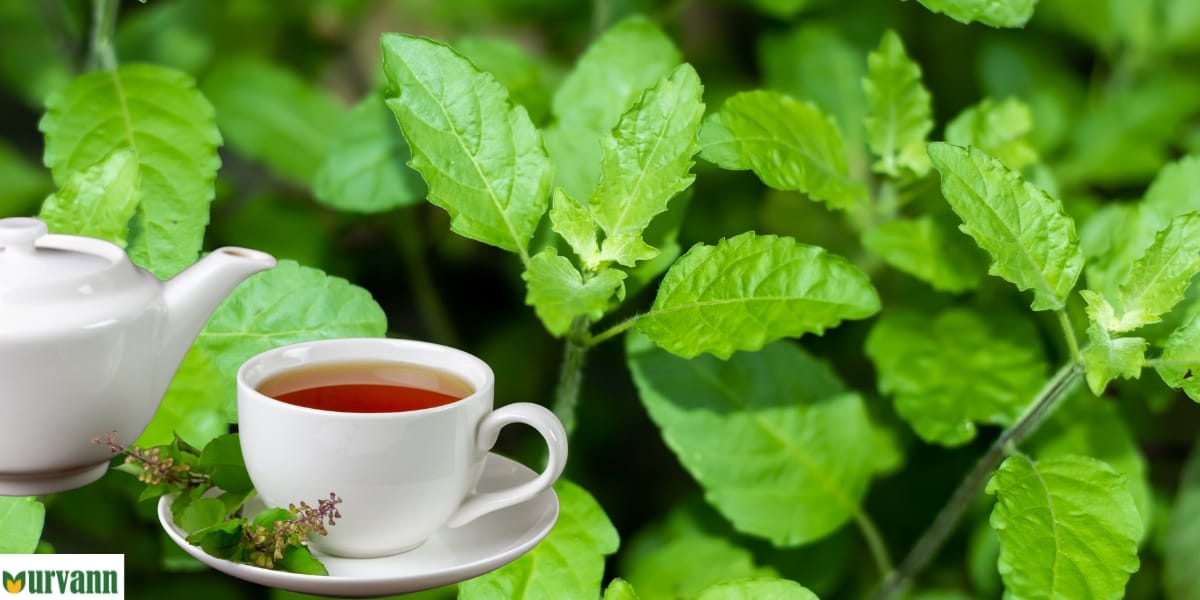From a beautiful balcony or terrace garden of an Indian home to temples, the Tulsi plant is found everywhere. It is not just ornamental but holds great significance in Hinduism. Tulsi, or the Holy Basil, is worshipped as a Goddess who brings prosperity and well-being to a household. It is offered water and prayers first thing in the morning and is considered a part of the daily home rituals.
Tulsi is known as the ‘Queen of Herbs’ and has been used in many forms of traditional medicine for its superb healing properties, which help to cure many ailments and infections.
Since we already live in an unhealthy, polluted environment, we must take measures to protect our respiratory system from getting clogged by air impurities. The rising cases of obesity, diabetes, and heart-related diseases have made it all the more important to focus more on our health.
Today, let us talk about the transformative power of Tulsi leaves to make you healthy and glowing.
Significance Of Tulsi
Remember when you were young and had a slightly runny nose or a minor cough? Your mother immediately got you a cup of warm water boiled with tulsi leaves to drink. Whether used as tea or in powdered form, Tulsi worked like magic. It immediately brought relief to your throat and made you feel better.
Well! Tulsi is rich in antioxidants and has anti-inflammatory properties.
What exactly are antioxidants?
In simple language, they are compounds that prevent cell damage caused by free radicals in the human body. Antioxidants help to prevent illness and are essential for survival. They are found in almost all plant-based foods in varying quantities.
Types Of Tulsi
Before we discuss the fantastic benefits of Tulsi, let's discuss the four major types commonly found in our country.
-
RAMA TULSI
Rama Tulsi is slightly sweeter and more aromatic than the others. It is also known as Sri Tulsi and is excellent for making teas, kadhas, and chewing. The leaves are also a brighter shade of green.
-
SHYAMA TULSI
Also known as Krishna Tulsi, the leaves of this plant are slightly purplish and crisper than Rama Tulsi's. The leaves are frequently used to cure skin infections, minor lesions, and even throat infections.
-
VANA TULSI
Vana Tulsi, or Wild Tulsi, is commonly found in the Himalayan region. The plant's leaves have a strong aroma, and mountain people use them to boost immunity. Vana Tulsi is also believed to have anti-ageing properties.
-
KAPOOR TULSI
Kapoor Tulsi is medicinal. Its strong fragrance makes it highly effective in keeping mosquitos and insects at bay.
Benefits Of Tulsi
Tulsi has tremendous healing power. Consuming its leaves in any form can be beneficial for your overall health.
-
Helps In Losing Weight
Tulsi is effective in weight loss. It helps increase metabolic rate, so the body can burn off more calories and store less. Boil a few leaves of tulsi in about 250 ml of water. Let the water cool to room temperature, and have it on an empty stomach. It will help maintain an ideal weight, fight off infections, and build immunity.
-
Manages Blood Sugar
Many studies have found that chewing Tulsi leaves on an empty stomach helps manage blood sugar levels. It is an easy, cost-effective way to see a significant change in Diabetes. Regular consumption of Tulsi leaves can make a considerable difference if someone has been diagnosed with a Pre-Diabetic condition.
-
Good For Gut Health
Tulsi has antibacterial properties that help improve digestion and flush out toxins. Chew a few leaves after a meal for a smooth digestive process.
How To Consume Tulsi Leaves
Tulsi is a remarkable herb that can be consumed in many ways for maximum benefits. Here are some of them:
Tulsi Tea
One of the most popular ways that Tulsi is consumed in most Indian households is in the form of tea.
- Pluck a few Tulsi leaves, wash them, and boil them in half a glass of water.
- Strain it after boiling the water for 5-6 minutes, add honey and lemon for taste, and enjoy.
- Savour the taste.
Tulsi Kadha
You must be familiar with the Tulsi kadha, your mother or grandmother when you have a sore throat or a runny nose. It is great for your respiratory system and flushes out the impurities.
- Boil Tulsi leaves with ginger and cloves in water until the volume of water reduces to half the quantity.
- Strain the extract and sip on the kadha while it is a little warmer than room temperature.
Tulsi Leaves and Powder
Chewing on fresh Tulsi leaves in the morning or after a meal has proven highly beneficial. It also freshens your breath.
If you do not want to chew on leaves, you can consume Tulsi in powder form.
- Mix Tulsi powder with a teaspoon of honey and yoghurt, or simply mix it in warm water and enjoy.
Conclusion
Tulsi is a magical herb that promises a treasure trove of health benefits. It is a powerhouse of benefits from boosting immunity to maintaining healthy skin and hair.
Plant a few Tulsi plants in your garden and ensure a healthy lifestyle without spending another penny on expensive medicines or supplements. The ancient herb of our culture was a miracle known by our ancestors and one that we must worship and use to keep ourselves healthy.
After all, isn’t your body like a temple, too? Keep it clean and pure, rewarding you with a healthy life.
Happy Gardening! 🪴🌱


